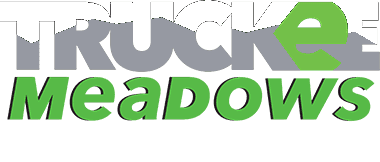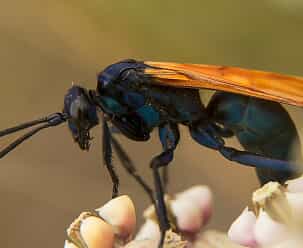Tarantula Hawks | Neither Tarantula Nor Hawk!
The Tarantula Hawk is not often seen here locally, but they are in fact here, in our area, including tarantulas! There have been more sightings of these wasps over the last few years. They are native to the southwestern United States, including Nevada. They tend to inhabit desert regions, so they may be found in areas such as the Nevada desert or nearby mountain ranges. However, it's important to note that while they are fascinating creatures, their sting is very painful and potentially dangerous, so it's best to observe them from a safe distance.
Here at the Truckee Meadows Pest Control office, there is a Tarantula Hawk on display, along with other native insects that have been collected.
The Painful Sting of the Tarantula Hawk: A Docile Pollinator with a Ferocious Defense Mechanism
The Tarantula Hawk is a spider wasp and it has the second most painful sting in the world, next to the Bullet Ant. It is highly unlikely you will ever get stung by one unless perhaps you step on one, but if you do get stung, lie down and scream! At least that is what Justin O. Schmidt, Entomologist and Author of The Sting of the Wild: The Story of the Man Who Got Stung for Science, likes to say at his speaking engagements. In his book, he describes the sting, stating that “The pain is so debilitating and excruciating that the victim is at risk of further injury by tripping in a hole or over an object in the path and then falling onto a cactus or into a barbed-wire fence. Such is the sting pain that almost nobody can maintain normal coordination or cognitive control to prevent accidental injury. Screaming is satisfying and helps reduce attention to the pain of the sting.” On the more fortunate side, the pain only lasts a few minutes, unlike the bullet ant which can last quite a few hours.
Interestingly, despite its fearsome reputation, the Tarantula Hawk is docile and even beneficial to the environment. It's an effective pollinator, particularly for the desert or rush milkweed. As it drinks the nectar from these flowers, its legs naturally pick up pollen bundles called pollinia, which then get transferred to other milkweeds, facilitating pollination. This plant is a crucial food source for the monarch and queen butterfly larvae, so the Tarantula Hawk plays a vital role in their survival.
10 Interesting Facts About The Tarantula Hawk:
The Tarantula Hawk is a fascinating and impressive creature. This species of wasp is one of the largest in the world reaching up to 2½ inches in length, and it has a unique hunting technique that involves paralyzing tarantulas and using them as food for their offspring. Here are some interesting facts about the Tarantula Hawk that you may not know.
- It has a shiny metallic blue-black body with bright yellow-orange wings, making it easily identifiable.
- The Tarantula Hawk is named after its ability to hunt and drag enormous tarantulas to its nest burrow.
- Only female Tarantula Hawks can sting, and their stingers are formidable, commonly 1/3 inch long.
- The Tarantula Hawk's sting is the second most painful in the world, after the Bullet Ant, but it is unlikely to sting humans unless provoked.
- The Tarantula Hawk is a solitary spider wasp and has no known real predators.
- Female Tarantula Hawks carefully battle with the tarantula and sting it between the leg base and sternum, paralyzing it within two seconds.
- Once paralyzed, the Tarantula Hawk drags the tarantula back to its nest burrow to lay its solitary egg on the spider's abdomen.
- The Tarantula Hawk larva feeds off the live paralyzed tarantula over the course of 20-25 days, avoiding the primary organs to keep the spider alive for a longer period.
- The Tarantula Hawk larva will consume the rest of the tarantula and then cocoon itself and pupate.
- If the cocooning happens in early spring, the Tarantula Hawk will emerge as an adult in a few weeks, otherwise, it will remain over winter and emerge in the following spring.
It’s unlikely you will be contacting Truckee Meadows Pest Control about an issue with Tarantula Hawks but please give Truckee Meadows Pest Control a call at (775) 535-5788 if you are having any wasp or bee issues as flying stinging insects can cause harm to you, your loved ones and your pets.


